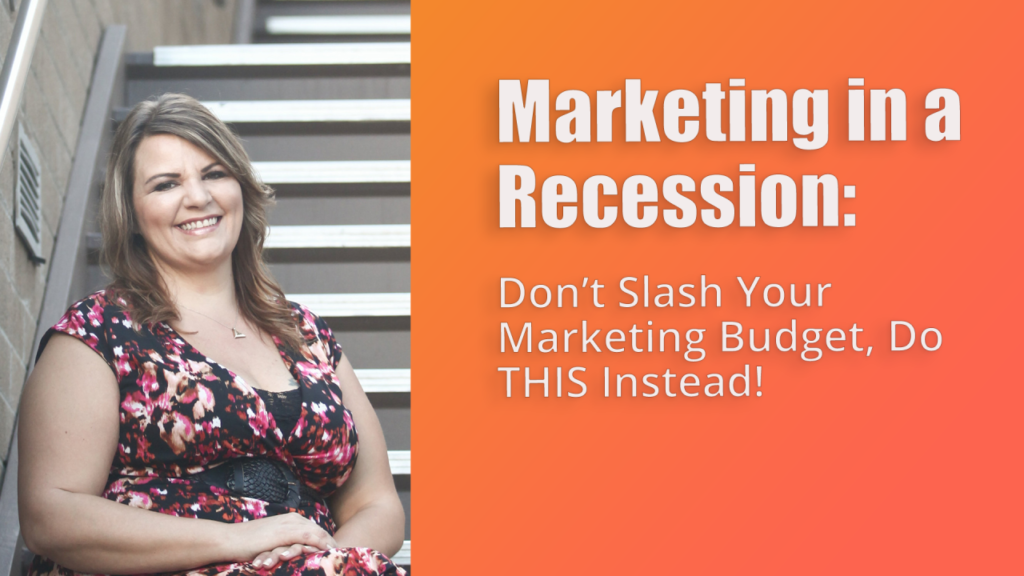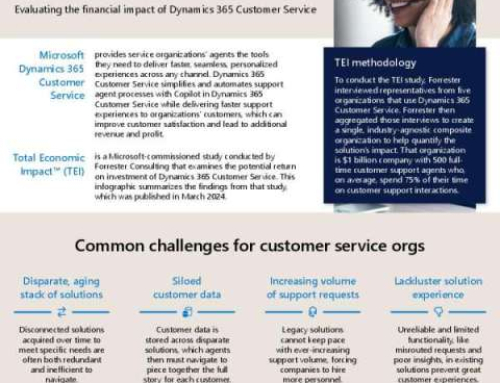Marketing in a Recession: Don’t Slash Your Marketing Budget, Do THIS Instead!
– Written by our Guest Blogger, Angela Cook

With all the talk of economic downturns and impending recession, you may be thinking about how the current climate will impact your business. A recession marketing strategy may not be the first thing you thought about… but maybe it should be.
In tough economic times, many businesses slash marketing budgets first. Marketing is disproportionately hit by budget cuts, but should it be?
Let’s talk about why it happens and what you should do instead.
One of the biggest mistakes business leaders makes is to look at marketing as a discretionary expense rather than an important investment in the sustainability of your business.
Typically, that’s because they are doing it wrong. That may sound a bit harsh, but if a business isn’t tracking and optimizing the ROI of all its marketing efforts in times of prosperity, it could be an easy decision to cut spending during lean times.
If there isn’t any data to support otherwise, it seems like a no-brainer!
But what if you could easily see which marketing initiatives were giving you a 10:1 return or even a 5:1 – would you be so quick to slice off your moneymaker?
Not likely. Especially during a downturn.
An effective marketing strategy should be the driver of your business, and if it’s not – well, you’re doing it wrong. The question is, can you afford to continue?
As we teeter on the brink of yet another economic shake-up, let’s look at the top 3 things you shouldn’t include in your recession marketing strategy – and what you should do instead.
Don’t: Panic and Raise Your Prices
You may be tempted to increase your price point to replace lower sales volume with higher margins. Historically, businesses that raised prices during a recession have lost market share in the long run. When consumers are pressed financially, they become even more price sensitive.
Companies who raise prices during these times lose the trust of their loyal customers and almost always end up cutting prices later on or offering promotional pricing. That dilutes your brand reputation and positioning in the marketplace, and your competitors who didn’t make that mistake will be there to catch the fallout.
Do This Instead: Streamline Your Offerings
When consumer spending is down, your customers are being extra conscious about their purchases. This is the time to look through your product or service portfolio and focus your marketing efforts on a more value-based offering. This requires a deeper understanding of your customers and what is important to them during this time.
Don’t: Panic and Slash Your Prices
Watching sales tumble during an economic slump can be unnerving, but it’s important to keep a cool head and a proactive approach. The average recession lasts about a year but altering your brand’s position by spiraling downward into a price war can have a permanent impact on your reputation – and future profits. If you’re not already the Wal-Mart of your industry, it isn’t wise to begin acting like it now.
Do This Instead: Re-Engineer Your Value Proposition
One historically effective strategy is to introduce a ‘fighter brand’ – a lower-cost alternative to your main line of offerings. This strategy allows you to hold on to and even gain market share that could be lost to competitors vying for price-conscious consumer dollars.
The new brand could be a ‘base-model’ version of your higher-end products, or it could be the same products simply rebranded. The fighter brand can either be rolled back when the economy picks up or expanded as a value offering.
This gives you the flexibility to compete on price without damaging your core brand.
Many brands have successfully used this strategy, including Intel’s Celeron, GM’s Saturn, and Whole Foods 365.
Don’t: Simply Slash Your Marketing Budget
Companies who have fared the worst during a recession simply cut back on their ad quantity but maintained the same content and messaging as they did in a thriving economy.
Cutting your marketing budget is like firing your top salesperson and then wondering why sales tanked.
Marketing is a business driver – it directly impacts the revenue of your business. If you cut marketing during a recession, you suffer from the consumer belt-tightening, AND you also minimize exposure to your brand and calls-to-action, so your bottom line takes a hit two-fold.
It’s also important to revisit your content and messaging to connect with your customers in their current state of mind. The psychology of the consumer is impacted by tough times, sometimes even more than the impact on their financial health.
Running the same game as though nothing changed will not be as effective, even with those who responded well to your ads before.
Do This Instead: Change How You Spend It
First, it’s critical that you look at marketing as an investment in the success of your business. If you really need to reduce marketing spend during a recession, be sure to use a scalpel, not a butcher knife.
To craft an effective recession marketing strategy, you’ll want to redirect spend from loose or low-performing initiatives into data-driven, targeted campaigns. This could mean redirecting resources from broad-reach marketing categories like television, radio, and print advertising in favor of narrow reach marketing categories like email, SEO, and PPC.
You may reach fewer people using narrow-reach marketing, but you can target the right people and maximize your marketing spending.
The upside with this approach is you will have a very clear understanding of the performance of your marketing spend so you can easily justify the cost.
Your advertising in a recession should connect with the audience in a way that they feel you understand the challenges they are facing. Avoid language that focuses on luxury or carefree spending – it’s likely not how they are feeling – or your brand will appear out of touch. Spend some time reflecting on the challenges they may face, and then reflect on those challenges in your messaging.
Walking into uncertain financial times is uncomfortable for both businesses and consumers. With the right approach, you can ensure that your organization survives and even thrives.
In a time when fear is driving the decisions of your competitors, you will stand out as a leader in your industry and strengthen the relationship you have with your customers.
I hope this helps! Thanks for reading and subscribing.
Angela Cook









Leave A Comment